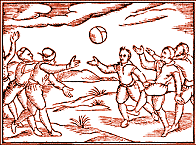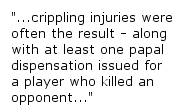
Gothic Design
Learn More.
| HOME Feature Articles Stone Carver's Tour Virtual Cathedral Cathedral Tours Gothic Field Guide GOTHIC GEOMETRY Virtual Abbey Medieval Art Tours Castle Tours Links Resources About The Site FAQ |
Soccer Madness in the Middle Ages
Of course, most of the violence in medieval times was confined to the field. The original game, either in the market square or countryside, was traditionally played on Shrove Tuesdays and other medieval Holy Days. After church Mass, a no-holds barred contest let loose with the traditional carrying, punching and kicking - with the ball, however, as an afterthought. By British tradition, the first ball in use was the head of a Viking invader. The more civilized practice - the use of an inflated pig's bladder filled with dried peas - caught on later.
Nonetheless, unchecked mayhem seemed to be the overall object of the games, some played over miles of countryside, pitting entire villages of men and women (numbering in the hundreds) against each other in days-long matches. Crippling injuries were often the result, along with at least one papal dispensation issued to one player who accidentally killed an opponent. In urban areas, games were sometimes confined to the market square with the inevitable result of spilling out onto the city streets. This could be bad for business, and merchants' protests finally forced the hand of Nicholas Farndon, Mayor of London, who issued the very first edict banning the game in 1314: "And whereas there is a great uproar in the City through certain tumults arising from the striking of great footballs in the field of the public – from which many evils perchance may arise – which may God forbid – we do command and do forbid, on the King's behalf, upon pain of imprisonment, that such games shall not be practised henceforth within this city." The proclamation was, of course, ignored. *When a last-minute payment was made on a debt - or, in this case - a score resulted in a victory the final nick gave rise to the expression 'in the nick of time. ' |
Sponsored
Links
copyright © 2017
 Although
'football hooliganism' amazes audiences in America, (where soccer
is still pretty much a mystery) the televised violence of the fans
is suprisingly similar to the bloodshed seen in the Middles Ages.
Although
'football hooliganism' amazes audiences in America, (where soccer
is still pretty much a mystery) the televised violence of the fans
is suprisingly similar to the bloodshed seen in the Middles Ages.
 In
some medieval communities, game scores were recorded using an old
accounting practice, common in the Middle Ages, of notching sticks
of wood called 'tallies' that were nicked each time one side scored.
In
some medieval communities, game scores were recorded using an old
accounting practice, common in the Middle Ages, of notching sticks
of wood called 'tallies' that were nicked each time one side scored.